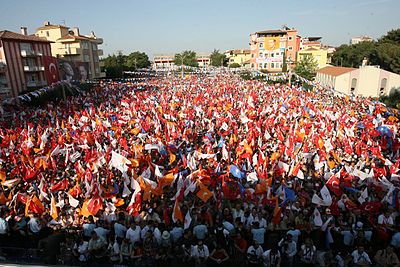| Main page | Showcase | Project |
Introduction
Conservatism is a cultural, social, and political philosophy and ideology that seeks to promote and preserve traditional institutions, customs, and values. The central tenets of conservatism may vary in relation to the culture and civilisation in which it appears. In Western culture, depending on the particular nation, conservatives seek to promote and preserve a range of institutions, such as the nuclear family, organised religion, the military, the nation-state, property rights, rule of law, aristocracy, and monarchy. Conservatives tend to favour institutions and practices that enhance social order and historical continuity.
Edmund Burke, an 18th-century Anglo-Irish statesman who opposed the French Revolution but supported the American Revolution, is credited as one of the forefathers of conservative thought in the 1790s along with Savoyard statesman Joseph de Maistre. The first established use of the term in a political context originated in 1818 with François-René de Chateaubriand during the period of Bourbon Restoration that sought to roll back the policies of the French Revolution and establish social order.
Conservatism has varied considerably as it has adapted itself to existing traditions and national cultures. Thus, conservatives from different parts of the world, each upholding their respective traditions, may disagree on a wide range of issues. One of the three major ideologies along with liberalism and socialism, conservatism is the dominant ideology in many nations across the world, including Hungary, India, Iran, Israel, Italy, Japan, Poland, Russia, Singapore, and South Korea. Historically associated with right-wing politics, the term has been used to describe a wide range of views. Conservatism may be either libertarian or authoritarian, populist or elitist, progressive or reactionary, moderate or extreme. (Full article...)
Selected article
He is mainly remembered for his support of the cause of the American Revolutionaries, and for his later opposition to the French Revolution. The latter led to his becoming the leading figure within the conservative faction of the Whig party, which he dubbed the "Old Whigs", in opposition to the pro–French Revolution "New Whigs", led by Charles James Fox.
Burke was praised by both conservatives and liberals in the 19th century. Since the 20th century, he has generally been viewed as the philosophical founder of modern Conservatism, as well as a representative of classical liberalism.
Selected quote
It only takes 20 years for a liberal to become a conservative without changing a single idea.
— Robert Anton Wilson, The Illuminati Papers (1980)
Selected image
On April 14, 2007, an estimated 300,000 people marched in Ankara to protest the possible candidacy of Justice and Development Party leader Recep Tayyip Erdoğan in the Turkish 2007 presidential election, afraid that if elected as President, he would alter the secular nature of the Turkish state. The protests continued over the next several weeks, with over one million reported at an April 29 rally in Istanbul. Early parliamentary elections were called after the failure of the parties in parliament to agree on the next Turkish president. The opposition parties boycotted the parliamentary vote and deadlocked the election process. The AK Party achieved victory in the rescheduled July 22, 2007 elections with 46.6% of the vote, translating into control of 341 of the 550 available parliamentary seats.
Credit: Randam
Did you know...
- ... that the film Ronald Reagan called "the worst picture I ever made" inspired Jerry Parr to join the Secret Service, and that Parr saved President Reagan's life during the 1981 assassination attempt?
- ...that Geoffrey Wheatcroft, the author of The Strange Death of Tory England, advises British conservatives to learn from the conservatism of the socialist George Orwell?
- ... that Canadian Conservative Party candidate Bernard Trottier won a seat in the 41st Canadian Parliament by defeating the incumbent Michael Ignatieff, the leader of the Liberal Party and leader of the Official Opposition, in the 2011 federal election?
Selected anniversaries in November
- 1790 – Edmund Burke publishes Reflections on the Revolution in France, which influenced conservative and classical liberal intellectuals in the 20th century.
- 2002 – the Justice and Development Party wins a landslide victory in the Turkish general election

- 1980 – Ronald Reagan defeats Jimmy Carter in the presidential election (map of results pictured) and becomes the 40th President of the United States.
- November 8th
- 2016 – Donald Trump defeats Hillary Clinton in the presidential election (map of results pictured) and becomes the 45th President of the United States.
Topics
Associated Wikimedia
The following Wikimedia Foundation sister projects provide more on this subject:
-
Commons
Free media repository -
Wikibooks
Free textbooks and manuals -
Wikidata
Free knowledge base -
Wikinews
Free-content news -
Wikiquote
Collection of quotations -
Wikisource
Free-content library -
Wikiversity
Free learning tools -
Wiktionary
Dictionary and thesaurus









